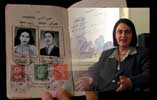Short review from the weekend’s conference/screenings/concerts on middle east: What started as the show ‘The Iraqi Equation’* became now continued under the very vague title ‘Middle East News‘. Thematically presented lectures, films and concerts were not so much angeled around the major view point of Iraq but attempting to cover various aspects of the entire region.
This made it partly difficult to find a specific access and discussion point beyond what F.Halliday described as the audience’s common interest into the region.
His talk then logically tried to cover and convert some general prejudices of the West covering the area from ancient Yemen, to Egypt, Palestine, etc …. Some of his tremendously interesting details (about mixture of languages, movement of populations, …) and his specific commitment to demystifying traditions showed that he refers to a broad knowledge which if clearly focused becomes highly illuminating.
Examples for some of these unfounded myths can be found in his recently published book where he attempts to undress them through facts.
*The Arabs are a desert people. /
*There is today one Arabic language,spoken from Iraq in the east to Morocco in the west. /
*Oil has been and may become even more of a source of conflict in the modern Middle East. /
*Islam does not allow for a separation of religion and politics. /
*Palestinian nationalism is a creation of Arab states and manipulated by them to put pressure on Israel. /
*Israel is not a colonial or settler state. /
*Islam forbids alcohol. /
*For Muslim women, it is compulsory to wear a headscarf or veil.
(100 Myths about the Middle East)
Loretta Napoleani gave a speech around her recent book which traces her latest research concerning the person of Al-Zarqawi (and here). The interesting talk she gave failed to establish a coercive line despite a lot of persuasive details as the convictions she based on the gathered information were not always traceable (even though she explained that she uses only arabic sources and translaters to escape a westernized influence). The same impression of a simplification of intentions and vocabulary occured for the classificational system she used – like when drawing a line from her early research about the ‘red brigades’ (Italy’s ´70s terror group with marxist background) – to address terror and symptoms as consequently induced effects in the middle east.
The most remarkable experience in my eyes was Samir’s (interview) film ‘Forget Bagdad’ – a documentary on Arab Jews (all born in Iraq) reflecting on their lives and issues of identity as being thrown between the dividing lines of prejudices of ethnicity and religion. The film has been described as a bit lengthy in parts but it is presenting a unique material and definitely worth to follow through. The line of their story telling is accompanied by a lively editing which supports the flow of information and visual impressions. The film concentrates on the stories of four (former) members of the Iraqi Communist Party who due to their leftish convictions against Zionism and experience of anti-Mizrachi (Middle Eastern Jew) discrimination** could never identify with the new place to live – the place of the considered enemy.
| Their rememberances become especially underlined through an excerpt of Ella Shohat‘s live interview (taken after the publication of her first book on cinema and identity) in which she addresses the existing racism in Israel. But already her childhood memories full of lived unconcious ambivalence from being torn inbetween |
 |
| at least two worlds create a lasting impression for the quest which might have lead to her specific research interest in ‘politics of representation’. | |
Generally this is a highly interesting film telling neglected stories of complex identities and by this is questioning simplifying ideas of nationality and identity.
Interesting enough that this film project at the same time referred to both the most global and local aspects of culture, politics and defining these …
*part of the ongoing C.David project ‘Contemporary Arab Representations‘ (netzzeitung)
** E.Shohat’s article Reflections By An Arab Jew
